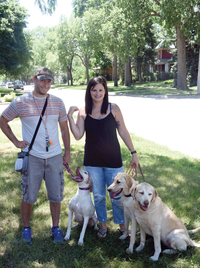Growing up, Clay and Rachel Stoddard each had a strong connection with dogs. Now, dogs are not only a part of their lives, but their livelihood.
The Yankton couple runs Dogsense Dog Training, a venture that has them working with dogs of all varieties.“The main focus of our training is behavior issues. We’ve worked a little bit with some gun shyness when it comes to hunting dogs,” Clay said. “Obedience training, behavior issues. We’ve been touching a little bit on working with some therapy dogs.”
The business grew out of their love of dogs, and a turningpoint in their lives.
“I had come to a point, where I had to figure out what was the next step,” Rachel said. “I did some researching, and I found this animal behavior college online, that was willing to work with you on in-home stuff, along with an internship.”
As Rachel studied, so did Clay.
“We spent a couple of years of just hands-on, and decided, hey, maybe we can make a go of this,” Clay said. “We’ve beend oing this for about five years now. It’s been a slow process, but I feel like, at this point, we’re confident enough in knowing what we are doing.”
The focus of the Stoddards is not just about training dogs, but in training people as well.
“We do more of a ‘help you train your dog’ kind of thing,” Clay said. “The majority of our training is positive reinforcement. We are familiar with as many different types of training as we can learn. We try to keep studying, keep on top of things.”
While the Stoddards do not specifically focus on training hunting dogs, they did train their own dogs for hunting and have helped clients with issues with their hunting dogs. The process of properly training a dog for hunting begins early.
“I would prefer starting training with a dog right when you get them from the kennel or pick them up from the litter. That’s when you start training the basics: simple obedience, manners, things like that,” Clay said. “As the dog gets a little bit older, you can start introducing some birds, getting the dog interested in the excitement of finding birds, working in a little more formal obedience, formal training after that.” Clay’s work with hunting dogs also inspired him to put his bio-chemistry degree to good use. He is currently working on a supplement to help dogs recover from a hard day of hunting.
“I started working as a consultant with a livestock nutrition company a few years ago, and I’ve been getting interested in nutrition and things like that for the dogs,” he said. “No matter what kind of shape they’re in, the next day they’re sore. It takes a little bit for them to get moving again. Sometimes they might not have the stamina that they had before, on the second day or the third day or the fifth day of the hunt.”
While training dogs is a part of their livelihood, it is also a part of the family for the Stoddards. Daughter Remi, 3, and son Wyatt, 2, are both involved in the training process.
“I think Remi’s been in training classes with us since she was born,” Rachel said. “Our kids always want to be hands-on with them, constantly wanting to help with training.”
Remi and Wyatt are not involved in every phase of training, but they help by being themselves.
“We use our children as different distractions and tests for different dogs,” Clay said. “We’ve had clients who have been pregnant with their first kid and been asking what they can do to help their dog welcome and adjust to a new child coming. We’ve used our own children to show some of the things that children do different than adults and how dogs interact with them, making it a positive experience for the dogs and for them.”
Remi will even “train” her toy dogs, Clay noted.
Both Clay and Rachel hope to keep Remi and Wyatt involved in the process for as long as they want.
“We are a family, our dogs, our children. We like to work together,” Clay said. “As long as the kids are interested in it, we will allow them to be interested. They can’t come to every training session, but we like to involve them as much as we can."



